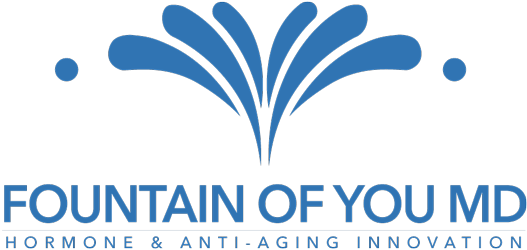I often tell my patients our grandfathers had twice the level of testosterone than we do. But because of modern lifestyles and environmental factors, many men experience loss of testosterone even at early ages. The average age of patients in my hormone replacement and anti-aging innovation clinic, Fountain of You, MD, in Virginia Beach is only 38 years old.
How Lifestyle Affects Testosterone
Obesity is definitely a huge factor in lowering levels of testosterone. It is estimated that approximately 70% of Americans are overweight, and, statistically, 70% of men over 50 years old have low testosterone.
Fat cells within the body convert testosterone into estrogen. Elevated estrogen levels make it extremely difficult to lose weight. That’s why many men find it harder to lose weight the larger they get and the older they get.
In my opinion, the biggest culprit in both the low T epidemic and the obesity epidemic is processed foods. We recommend our patients try a Paleo diet, or caveman diet.. This diet consists of non-processed foods like meat, eggs, fruits, vegetables, nuts, seeds, and whole grains. The Paleo rule is to shop around the outside of the grocery store, where fresher whole foods are sold, and stay out of the center aisles where processed foods are located.
Our food supply, which has been altered by pesticides and herbicides, plastics used in packaging and additives in foods, may also affect testosterone levels. The infiltration of soy, which can be estrogenic, as a low-cost protein booster in the American diet has contributed to rising estrogen levels. These factors make it even harder to control the hormones in our bodies.
Inactivity and stress also certainly contribute to the problems with testosterone and obesity. Americans experience high levels of stress, which affects physical and mental health. Many people sit behind a desk and get no exercise or very little vigorous activity in their days.
Low testosterone has been related to the opioid crisis, marijuana usage, alcohol abuse, and excess caffeine. All of these substances of abuse are known to lower testosterone and increase the conversion to estrogen.
While getting more exercise and eating a healthier diet may help testosterone levels, it may not be enough to overcome the effects of low T. Hormone replacement therapy can boost your testosterone levels, improving your mood and energy levels. When provided by experts, hormone therapy is safe and effective.
I am very proud of the fact that at Fountain of You, MD, 96% of our patients saw an improvement in their testosterone levels. We can help you feel younger again with hormone replacement therapy, weight management and more. Contact us today at 757-644-4615 to get back your energy.



